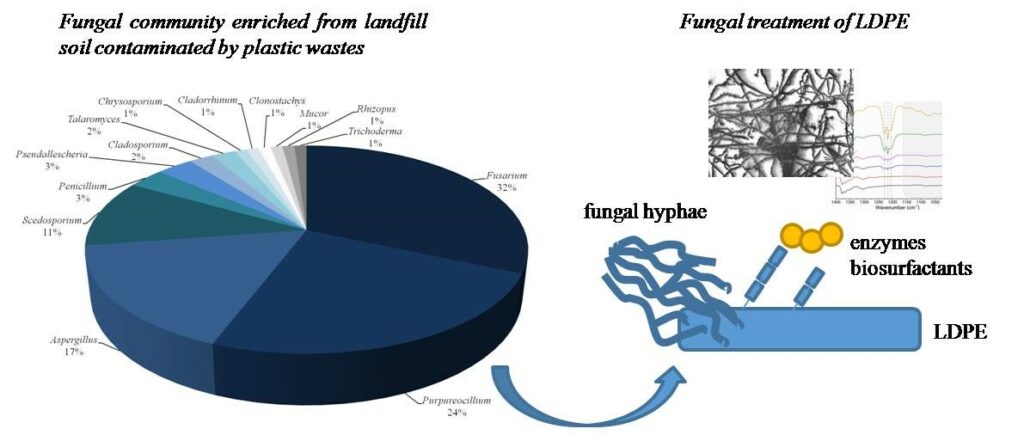
Federica Spina, Maria Laura Tummino, Anna Poli, Valeria Prigione, Viktoria Ilieva, Piersandro Cocconcelli, Edoardo Puglisi, Pierangiola Bracco, Marco Zanetti, Giovanna Cristina Varese. Environmental Pollution.
Topic: filamentous fungi, plastic polymers, biodegradation, SEM and FT-IT analysis
Polyethylene (PE) is the most abundant non-degradable plastic waste, posing a constant and serious threat to the whole ecosystem. In the present study, the fungal community of plastic wastes contaminating a landfill soil has been studied. After 6 months of enrichment, 95 fungi were isolated, mostly belonging to the Ascomycota phylum. They were screened under in vitro condition: most of the fungi (97%) were capable of growing in the presence of PE powder (5-10 g L-1) as sole carbon source. Fusarium strains better tolerated high concentration of PE. Up to 13 strains were chosen for further degradation trails, where the process was monitored by respirometry tests and by observing changes in PE chemical and physical structure by FTIR analysis and SEM images. Major results were observed for Fusarium oxysporum, Fusarium falciforme and Purpureocillum lilacinum, as they caused strong oxidation phenomena and changes in the PE film morphology. Results suggested that the initial oxidation mechanisms targeted first the methyl terminal groups. Changes in the infrared spectra were strongly strain-dependent, denoting the activation of different degradation pathways. Through the SEM analysis, the actual damages provoked by fungi were observed, including swellings, pits and furrows, bumps and partial exfoliations. Considering the rising concern about plastic disposal worldwide, the ability of these fungi to colonize PE and utilize it as carbon source is of great interest, as no pretreatments and pro-oxidant stimulants were needed.
A special thanks to JRU MIRRI-IT for the technical and scientific support. The authors gratefully acknowledge financial support from Fondazione CRT, under the “Erogazioni ordinarie 2019” Project 2019.0471. The work of EP and PSC was supported by Fondazione Cariplo, project 2014-0465 “Gaining insights in the microbial degradation of polyethylene plastics to promote efficient bioremediation strategies”.
Find the article here: DOI – https://doi.org/10.1016/j.envpol.2021.116548
Publisher: University of Torino, Italy
